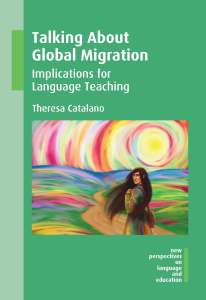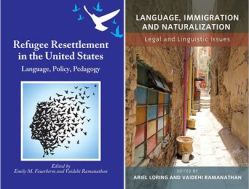This week we published Talking About Global Migration by Theresa Catalano which explores the narratives of 70 migrants and examines the language they use when talking about their experiences. Here, Theresa introduces some of their stories.
 Martez was born in Mexico City to Spanish parents. He met his wife in veterinary school in Costa Rica. They then moved to Alabama, then Canada, back to the US and eventually back to Canada. Even though he has lived in four different countries and gone back and forth among them, he has always felt Mexican. Martez has noticed how different countries have different terminology to talk about the legal status of migrants in their country such as calling migrants “legal aliens” (US) versus “landed immigrants” (Canada). The latter makes him feel more welcome.
Martez was born in Mexico City to Spanish parents. He met his wife in veterinary school in Costa Rica. They then moved to Alabama, then Canada, back to the US and eventually back to Canada. Even though he has lived in four different countries and gone back and forth among them, he has always felt Mexican. Martez has noticed how different countries have different terminology to talk about the legal status of migrants in their country such as calling migrants “legal aliens” (US) versus “landed immigrants” (Canada). The latter makes him feel more welcome.
Even though Thinh was very young when he arrived in the US, he remembers what a ‘struggle’ it was. He and his family did not speak English, and they had to rely on others for translations. Thinking back, Thinh recalls how shocked they were by everything in their new home, ‘bright city lights….Everything was amazing.’ Thinh was enrolled in English as a second language classes but when he was in third or fourth grade, he decided he did not want to be in those classes anymore because he felt that he had ‘grasped the language’.
Xui moved from China to Qatar for three years and then followed her husband to the US. She found it difficult to adapt to her new environment, but says that once you understand the culture of your new home, you might realize that your life there is more meaningful and colorful.
Cristina always dreamed of seeing the world. Born in Colombia, she moved to Spain for a job and then later moved to the US where she is now a professor. Cristina believes that immigration is a great risk, but it is a risk she would be willing to take again, even though she often feels as if she is living ‘in a limbo’— part of her in Colombia, part in Spain, and part in the US.
The above vignettes demonstrate the very diverse and complicated lives of globally mobile people in an increasingly mobile global landscape. This dynamic interplay of migrants of multiple-origin has changed city and rural environments around the world (referred to by Vertovec [2010] as ‘super-diversity’) and the increased movement of transnational migrants underscores the need for educational responses to migration that attend to the linguistic and cultural diversity of demographically changing student bodies and address the educational needs of newcomer students.
Hence, Talking About Global Migration attempts to re-complicate the often simplified and stereotyped stories of migrants who reside in increasingly diverse places in diverse contexts by talking with over 70 participants in 12 different countries, and providing useful information for language teachers (as well as anyone who comes into contact with migrants). In addition, I examine the metaphors and metonymies (see bolded words above) that migrants use when talking about their experiences. In doing so, I hope that people can better understand the way migrants perceive themselves and the migration experience and how this differs greatly from the way they are portrayed in the media. Furthermore, I hope to shed light on how migrants are affected by the way others refer to them, such as how Martez notes the different effect on him that the terms “legal alien” vs. “landed immigrant” have. In this way, I aim to raise consciousness about our own way of thinking and talking about migration.
If you would like to contact me about the book I can be reached by email: Theresa Catalano, tcatalano2@unl.edu
References:
Vertovec, S. (2010). Towards post-multiculturalism? Changing communities, contexts and conditions of diversity. International Social Science Journal 199, 83-95.
 For more information on Theresa’s book please see our website. You might also be interested in some of our other migration titles Refugee Resettlement in the United States edited by Emily M. Feuerherm and Vaidehi Ramanathan and Language, Immigration and Naturalization edited by Ariel Loring and Vaidehi Ramanathan.
For more information on Theresa’s book please see our website. You might also be interested in some of our other migration titles Refugee Resettlement in the United States edited by Emily M. Feuerherm and Vaidehi Ramanathan and Language, Immigration and Naturalization edited by Ariel Loring and Vaidehi Ramanathan.